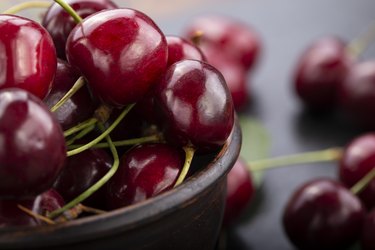
Gastroesophageal reflux disease (GERD) is irritation and inflammation of your esophagus caused by acid that seeps up from your stomach, according to the Mayo Clinic. That's why GERD causes heartburn. Cherries might be good for the inflammation caused by GERD, but could cherries cause heartburn?
"When it comes to foods and GERD symptoms, it is not so much about what you eat as when you eat and how much," says Abdul Haseeb, MD, assistant professor of gastroenterology at Loyola University Medical Center in Maywood, Illinois. "Different foods trigger GERD symptoms for different people. Acidic foods are worse on an empty stomach, and any food that you eat just before lying down can make GERD worse."
Video of the Day
Video of the Day
Read more: Fruits and Vegetables That Are Safe to Eat With GERD
Cherry Juice for GERD?
According to a March 2018 review in Nutrients on the health benefits of cherries, cherries are rich in antioxidant phenols and vitamin C. Foods high in antioxidants can help fight inflammation.
The Nutrients review of 29 studies found cherries may help with:
- Muscle soreness.
- Blood pressure.
- Sleep.
- Cholesterol numbers.
- Blood sugar.
There was also some support for benefits in arthritis and diabetes. These benefits are due to the anti-inflammatory effects of antioxidants in all types of cherries.
The review did not find any studies that looked at cherries for GERD, and you should know that the amount of cherries used in these studies ranged from 45 to 270 cherries per day. "Although there is no strong evidence that cherries help GERD, antioxidants from fresh fruits make sense, as long as they don't trigger your GERD symptoms," Dr. Haseeb says.
Cherries’ Acidity
The acidity of cherries is about the same as apples, according to Clemson University: firmly in the middle range of fruit acidity. Acidity is measured as pH — a lower pH means more acidic. For example, here are the approximate pH ranges of some common fruits:
- Lemons or limes: 2 to 3.
- Cherries: 3 to under 5.
- Melons or ripe mango: 5 to 7.
"Cherries or cherry juice does not show up on the list of foods that most commonly trigger heartburn in people with GERD. Because different people have different heartburn triggers, the best thing to do is keep a food diary to isolate your food triggers," Dr. Haseeb says. He cites these foods as the most common heartburn triggers:
- Coffee and orange juice, especially on an empty stomach in the morning.
- Carbonated beverages, because they increase pressure in the stomach.
- Citrus fruits.
- Alcohol.
- Chocolate.
- Fatty foods, because they slow down digestion.
- Garlic and onions, for some people.
The National Institute of Diabetes and Digestive and Kidney Diseases (NIDDK) adds mint and spicy foods to the list, and the Mayo Clinic warns about fried foods and tomato sauce.
Managing GERD
"You can treat GERD with over-the-counter antacids. The most effective medicines are usually proton-pump inhibitors like Prilosec and Nexium. If you have tried these medications and they have not helped in about one month, or if you have any trouble swallowing, you should talk to your doctor," Dr. Haseeb says.
Certain lifestyle changes can also help you manage GERD, Dr. Haseeb points out. They include:
- Reducing stress.
- Losing weight.
- Putting 6-inch blocks under the legs of your bed at the head of your bed (which works much better than a pillow wedge to keep stomach contents from seeping up).
- Keeping a food log to avoid foods that cause heartburn.
- Not smoking.
- Only drinking alcohol in moderation (if you drink).
- Not going to bed on a full stomach.
Finally, NIDDK says there are several effective surgeries that can tighten the valve between your stomach and esophagus. "This valve, called the lower esophageal sphincter, is the gateway for stomach acid into your esophagus," Dr. Haseeb says.
The bottom line on cherry juice, according to Dr. Haseeb, is that you can give it a try as long as it doesn't trigger heartburn. NIDDK says antacids and lifestyle changes are really the key to managing GERD. A final warning: "If you have any blood in your stool or throw up blood, let your doctor know right away. Sometimes GERD symptoms can be an ulcer," Dr. Haseeb says.
Read more: The Dos and Don'ts of Eating With GERD
- Nutrients: “A Review of the Health Benefits of Cherries”
- Mayo Clinic: “Gastroesophageal Reflux Disease (GERD)”
- Abdul Haseeb, MD, assistant professor, gastroenterology, Loyola University Medical Center, Maywood, Illinois
- National Institute of Diabetes and Digestive and Kidney Diseases: “Eating, Diet, & Nutrition for GER & GERD”
- Clemson University: “pH Values of Common Foods and Ingredients”
Is this an emergency? If you are experiencing serious medical symptoms, please see the National Library of Medicine’s list of signs you need emergency medical attention or call 911.